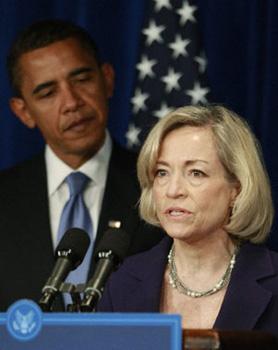World
Obama names "chief performance officer" to control federal budget
Source: Xinhua | 01-08-2009 08:36
Special Report: U.S.Presidential Election 2008WASHINGTON, Jan. 7 (Xinhua) -- U.S. President-elect Barack Obama Tuesday named a "chief performance officer," a newly-created position that would oversee the federal budget and reform government.
 |
| Nancy Killefer makes a few remarks after President- elect Barack Obama, left, introduced her to the newly created position of chief performance officer, Wednesday, Jan. 7, 2009, at his transition office Washington.(Xinhua/Reuters Photo) |
"We can no longer afford to sustain the old ways when we know there are new and more efficient ways to getting the job done," Obama told a news conference at his transition headquarters in Washington as he named Nancy Killefer for the post, "an expert in streamlining processes and wringing out inefficiencies."
Killefer, a senior director for McKinsey & Company who served as an assistant secretary of the treasury in former President Bill Clinton's administration, is expected to work with federal agencies to set performance standards to control budget waste and improve efficiency.
"We committed to change the way our government in Washington does business so that we're no longer squandering billions of tax dollars on programs that have outlived their usefulness or exist solely because of the power of a lobbyist or interest group," Obama said.
"We can no longer afford to sustain the old ways when we know there are new and more efficient ways of getting the job done," he added.
Obama made the announcement after he warned on Monday that the deficit will probably hit 1 trillion U.S. dollars this year and that "potentially we've got trillion-dollar deficits for years to come" unless policymakers "make a change in the way that Washington does business."
The president-elect has vowed to make it his priority in the White House to pull economy back to track. He and Congressional Democrats are working to have another economic stimulus package approved, which is expected to be up to 800 billion U.S. dollars, with aims at creating jobs and boosting consumption.



